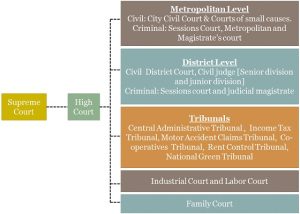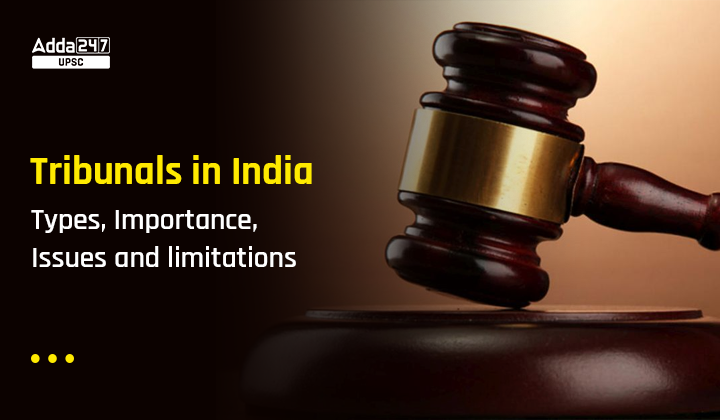Table of Contents
Introduction to Tribunals
Tribunals represent specialized judicial bodies designed to address specific categories of legal disputes, offering an alternative to traditional court proceedings. These quasi-judicial entities are established by governments to handle cases involving specialized areas of law, such as administrative, tax, labor, or environmental matters. Tribunals provide a more streamlined and accessible process for resolving disputes, often incorporating expertise in the relevant field.
This expertise enables them to deliver informed and efficient decisions, promoting a quicker resolution of cases compared to general court proceedings. While separate from the regular court system, tribunals are bound by legal principles and procedural fairness, ensuring that individuals and organizations receive a fair hearing and a just outcome.
Types of Tribunals in India
- Administrative Tribunals: Administrative tribunals are quasi-judicial bodies that are set up to adjudicate disputes between citizens and the government. Administrative Tribunals was set up by an act of Parliament, Administrative Tribunals Act, 1985. It owes its origin to Article 323 A of the Constitution. They were established to provide speedy and inexpensive justice in matters related to government employment, taxation, and other administrative matters.
- Central Administrative Tribunal (CAT): The CAT is the premier administrative tribunal in India. It was established in 1985 to hear appeals against the decisions of government departments and agencies. The CAT has jurisdiction over all matters relating to recruitment, promotion, transfers, disciplinary matters, and other service conditions of central government employees.
- State Administrative Tribunal (SAT): SATs are established by the state governments to hear appeals against the decisions of state government departments and agencies. The jurisdiction of SATs is similar to that of the CAT, but it is limited to matters relating to state government employees.
- Water Disputes Tribunal: The Water Disputes Tribunal is a specialized tribunal that was established in 1956 to resolve disputes between states over the sharing of water resources. The Tribunal has jurisdiction over all disputes that arise out of the provisions of the Inter-State Water Disputes Act, 1956.
- Armed Forces Tribunal (AFT): The AFT is a specialized tribunal that was established in 2007 to hear appeals against the decisions of the military authorities in matters relating to the service conditions of personnel in the armed forces. The AFT has jurisdiction over all matters relating to recruitment, promotion, transfers, disciplinary matters, and other service conditions of personnel in the armed forces.
- National Green Tribunal (NGT): The NGT is a specialized tribunal that was established in 2010 to hear environmental cases. The NGT has jurisdiction over all matters relating to environmental protection, including air pollution, water pollution, and land pollution.
- Income Tax Appellate Tribunal (ITAT): The ITAT is a quasi-judicial body that was established in 1963 to hear appeals against the decisions of the Income Tax Department. The ITAT has jurisdiction over all matters relating to income tax, including assessments, appeals, and refunds.
Importance of Tribunals in India
Tribunals play a vital role in the Indian legal system, fulfilling specific needs and addressing challenges that arise in various areas of governance and administration. Several factors underline the necessity of tribunals in India:
- Expertise: Many legal disputes involve complex technical or specialized subjects, such as taxation, environment, intellectual property, or administrative matters. Tribunals are staffed with experts in these fields, ensuring that cases are heard and decided by individuals with a deep understanding of the subject matter, leading to well-informed and accurate decisions.
- Efficiency: The traditional court system in India is often burdened with a large number of cases, leading to delays in justice delivery. Tribunals are designed to expedite the resolution of specific types of cases, reducing the backlog of cases in regular courts and providing quicker access to justice for litigants.
- Accessibility: Tribunals offer a more accessible avenue for justice, especially for individuals and businesses who may find the regular court system intimidating or cumbersome. The simplified procedures, specialized focus, and often lower costs associated with tribunals make them a more user-friendly option for resolving disputes.
- Administrative Matters: Tribunals handle administrative matters, providing an efficient mechanism to deal with issues related to public administration, regulatory compliance, and governmental decisions. This allows the regular courts to focus on more fundamental legal matters.
- Specific Legislation: Many areas of law require an in-depth understanding and interpretation of specific statutes. Tribunals are often established under the relevant legislation, ensuring that disputes arising from those laws are heard and decided by experts familiar with the legal framework.
- Reducing Judicial Burden: By delegating certain types of cases to tribunals, the regular court system can concentrate on cases that involve fundamental legal principles, thereby improving the quality of justice delivered.
- Flexibility: Tribunals have the flexibility to adopt procedures that suit the nature of the dispute, allowing them to adopt informal or specialized approaches that might not be feasible in regular courts.
- Consistency: Tribunals, being specialized bodies, contribute to the consistent application of law within their domain. Their expertise ensures that similar cases are decided uniformly, reducing the likelihood of contradictory judgments.
- Privacy and Confidentiality: In certain cases, such as matters related to family disputes or intellectual property, parties may prefer the confidentiality and specialized approach offered by tribunals.
What are the Constitutional Provisions?
In India, constitutional provisions related to tribunals are primarily governed by Article 323A and Article 323B of the Constitution of India. These articles provide for the establishment of administrative and other tribunals for the effective and expeditious resolution of specific types of disputes.

- Article 323A: Administrative Tribunals: Article 323A empowers the Parliament to establish administrative tribunals for the adjudication of disputes and matters related to the recruitment, conditions of service, promotions, and other service-related issues of public servants. The Administrative tribunals were added to the Constitution through the 42nd Amendment Act in 1976.
- Article 323B: Other Tribunals: Article 323B allows both the Parliament and state legislatures to establish tribunals for matters other than those covered under Article 323A. These “other” tribunals can include those dealing with tax, industrial, labor, and other specialized areas. The scope of Article 323B was added by the 42nd Amendment Act, similar to Article 323A.
These constitutional provisions enable the establishment of tribunals that serve as specialized forums for the resolution of disputes. While Article 323A specifically deals with administrative tribunals for public servants’ service matters, Article 323B grants flexibility to set up tribunals for a wide range of subject matters.
It’s important to note that while these constitutional provisions provide the framework for establishing tribunals, the specific procedures, jurisdiction, and functioning of each tribunal are defined by the respective legislations that create them. These legislations outline the composition, powers, and procedures of the tribunals, ensuring their efficient operation and adherence to principles of justice and fairness
Features of Administrative Tribunals?
- An Administrative Tribunal comes into existence through legislation.
- An Administrative Tribunal holds authority over the state’s judicial power and thus undertakes quasi-judicial tasks, differentiating them from purely administrative functions.
- The operations of an Administrative Tribunal are mandated to be judicial in nature and adhere to the principles of natural justice.
- An Administrative Tribunal is obliged to function transparently, justly, and neutrally.
- An Administrative Tribunal is not restricted by the stringent procedural and evidentiary regulations established by the civil procedure court.
Tribunals Issues
Tribunals serve as specialized judicial bodies that offer an alternative to traditional courts for resolving specific categories of disputes. However, like any legal system, tribunals are not without their issues and challenges. Some of the notable issues related to tribunals include:
- Independence and Impartiality: Maintaining the independence and impartiality of tribunals can be a challenge. Since tribunals are often established by the government, there might be concerns about undue influence or bias in their decisions, especially when cases involve government actions or policies.
- Lack of Uniformity: The proliferation of different tribunals for various subject matters can result in a lack of uniformity in decision-making. Different tribunals might interpret laws differently, leading to inconsistencies in legal precedents and confusion for litigants.
- Procedural Complexity: Some tribunals might have complex procedures that can be intimidating for litigants, especially those who are not legally trained. The intention of streamlined procedures can sometimes backfire if they become overly technical and difficult to navigate.
- Limited Appellate Review: In some cases, the right to appeal a tribunal’s decision to a higher court might be limited or non-existent. This can result in litigants feeling that they have no recourse if they believe the tribunal’s decision is unjust.
- Lack of Legal Safeguards: While tribunals are intended to provide efficient justice, there might be concerns about the adequacy of legal safeguards. For example, tribunals might not always follow the same stringent rules of evidence and due process as regular courts, potentially compromising the fairness of proceedings.
- Under-Representation of Marginalized Groups: Certain tribunals might not adequately represent the interests of marginalized or vulnerable groups, leading to their voices being overlooked in the decision-making process.
- Administrative Control: Tribunals are often subject to administrative control by the executive branch of government. This control can influence appointments, funding, and functioning, potentially impacting their independence.
- Resource Constraints: Some tribunals might face resource constraints, leading to delays in proceedings, insufficient staff, or inadequate infrastructure.
- Proliferation and Complexity: The sheer number of tribunals, each with its own set of rules and procedures, can lead to complexity and confusion for litigants and lawyers trying to navigate the system.
- Exclusivity of Jurisdiction: In cases where tribunals have exclusive jurisdiction over certain matters, litigants might not have the option to approach regular courts, even if they believe their case would be better served in a different forum.

| Relatable Articles | |
| Emergency in India | Centre State Relations |
| Special Provisions Act | Cooperative Societies |



 TSPSC Group 1 Question Paper 2024, Downl...
TSPSC Group 1 Question Paper 2024, Downl...
 TSPSC Group 1 Answer key 2024 Out, Downl...
TSPSC Group 1 Answer key 2024 Out, Downl...
 UPSC Prelims 2024 Question Paper, Downlo...
UPSC Prelims 2024 Question Paper, Downlo...





